by: Joshua Ogure August 14th, 2014 comments:
A Daily Diary post by Map Kibera team leader, Joshua Ogure
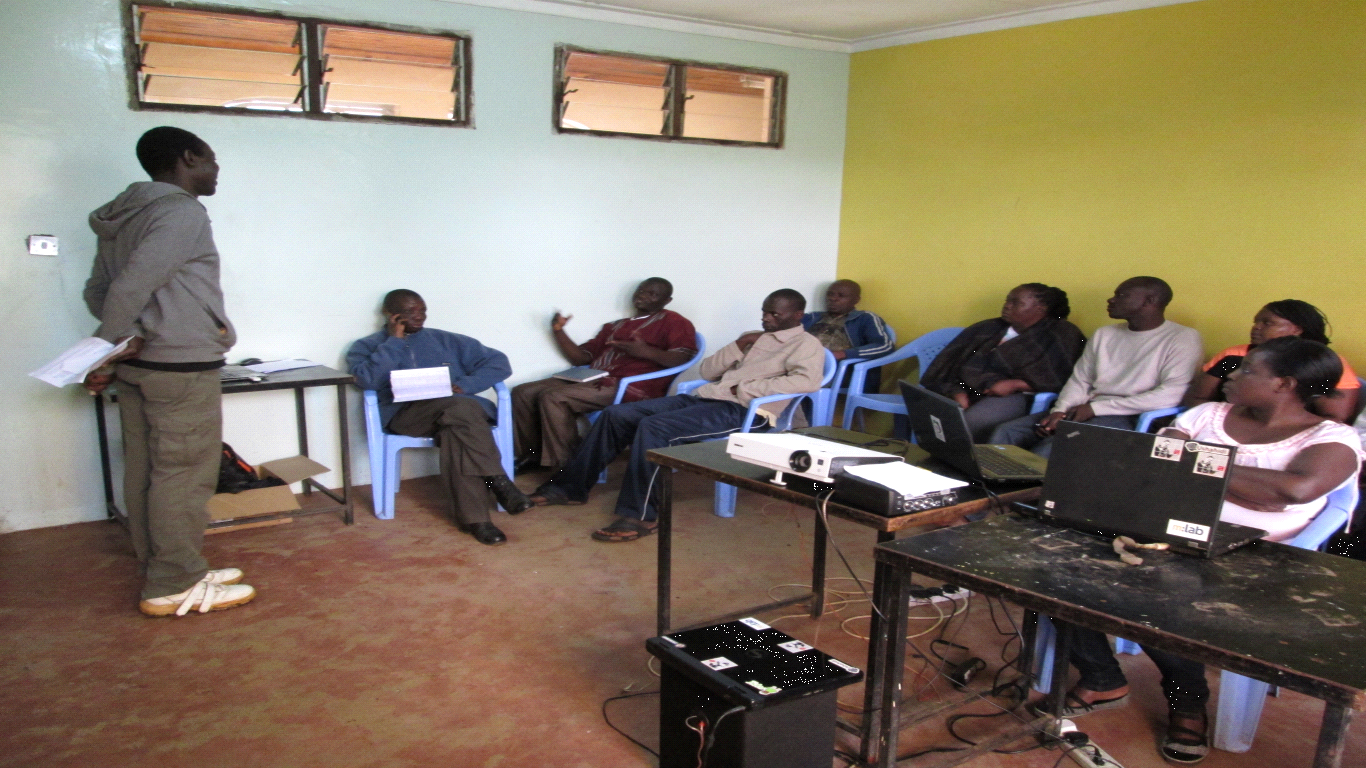
Meeting with Parents at AIC Church Olympic
I myself am a parent in Kibera. As a part and parcel of this project, having done the survey as well, I must say this project has already been of great benefit to me. I already know what kinds of schools exist in Kibera, where exactly they are, what programs they offer, and indeed how much they charge, because of this project. In fact I have decided which school my baby class daughter will attend come next year.
But it was interesting to see how other parents responded during a gathering we held to introduce them to our project. On Saturday June 7, 2014, the day after the meeting with teachers, we had a similar meeting with a portion of Kibera parents, held at one of the halls of AIC church in Olympic.
Parents too came late – lateness for parents was considered even more normal than for teachers. Anyway, the first ten minutes saw a very bored, non-interested parent, yeah, there were some technical hitches, one computer refused to connect to the internet keeping a section of parents waiting. Maybe it was the reason for low mood, but as the presentation continued, their presence could be felt. They started asking important questions and the house turned lively.
Different parents have different preferences, and in this meeting parents expressed their interest to have something that could help them make informed choices of which school to take their kids instead of relying mostly on the neighbors, or rumors. Parents wanted information on qualification of teachers, availability of scholarships/sponsors, security of their children, school fees, special programs, e.g. many parents prefer a school with feeding program. Parents also are keen on which faith a school is affiliated to, that is whether Muslim or Christian.
But many Kibera parents do not have an access to the Internet, so how would they get the information? They suggested that the information could be made available to them through printed booklets, SMS, Newsletters, Radio, or printed maps. They also preferred that we find a way to disseminate the data through public “Barazas†and parent meetings at schools.
Parents want all the relevant information including fees published online, something that some teachers were not so comfortable about. Teachers were worried that it would be too easy for the public including “bad people” to just calculate what amount of money a school gets monthly or yearly, if the fee verses the population is put public. They feared that this would trigger attacks at schools since most of the parents pay cash. Parents on the other hand want to know how much schools charge versus how populated they are. Many parents would avoid overpopulated schools.
Parents also were so brave to declare that they will not be worried to have their names attached to a comment on the website for fear of victimization. “In fact that one should be encouraged so that schools can be criticized for a positive change,” says Mr. Nyamweya Ngare, a parent at Olympic Primary School. “It will also increase the level of transparency,” he added.
From these two important forums, the questions, the comments, the points, the concerns and the ideas contributed, helped us get a clear direction on what kind of information to go for. Wednesday the following week we were set to roll, taking pictures and asking questions at every school in the field.
By Joshua Ogure
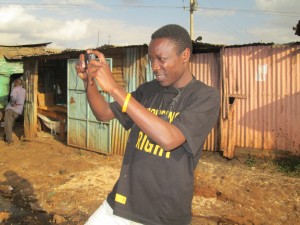
Joshua Ogure, Map Kibera team coordinator
by: Joshua Ogure August 5th, 2014 comments:
A Kibera Diary post by Map Kibera team leader, Joshua Ogure
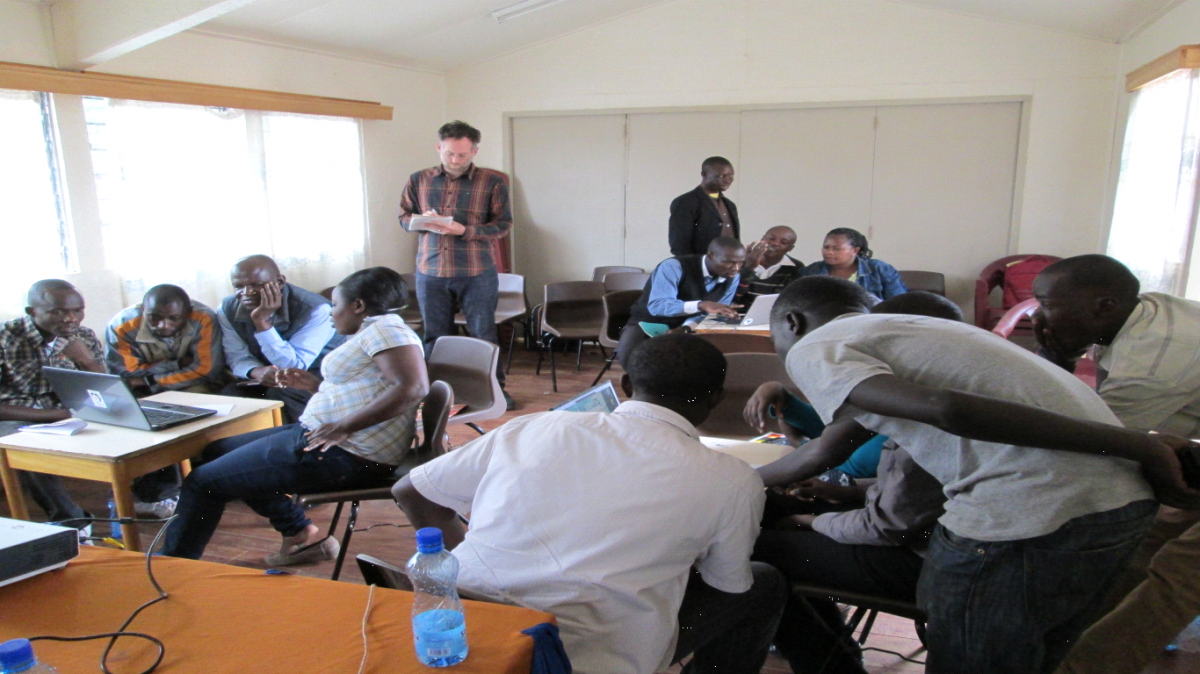
Meeting With Teachers at Mchanganyiko Hall
In April 2014, my colleague Steve and I conducted a pre- project survey in Kibera, talking to parents, teachers and school heads. This was meant to find out the missing gaps on education information, and what their thoughts were on Map Kibera Trust, GroundTruth and other partners trying to make education information easily available, accessible and useful to everybody.
This was important to know before the actual project could kick off. Kibera people know exactly what they want, and no one can impose anything on them against their will. There is something that anybody who wants to do any project not only in Kibera but also other informal settlements must always observe: that you must involve the people, I mean the stakeholders at a really early stage. If you want your project to succeed, let it be a people-driven idea.
Meeting with Officials, School Leaders and Teachers
One of the Map Kibera founders, Mr. Mikel Maron, was travelling to Nairobi in June 2014, and there was a need for him to meet and engage with all the relevant stakeholders and authorities. I was to arrange and schedule for all these meetings, and so the planning began.
We began by meeting the Chief, the Assistant County Commissioner, and the Langata District Education Officer (DEO). The reason was to explain to them what our education project was all about, and what exactly we intended to do in the process and how it would be helpful to the community, as well as to seek for their support/approval/permission. This was also a sign of respect to them, by informing them prior about what was to happen in their localities. The approvals and interest shown by the authorities really gave us more courage and confidence to proceed with the project.
This was immediately followed by the stakeholder’s forum for School Heads and teachers, whose contacts we had gathered during the pre-survey interviews. We held our first meeting on June 6 inside the famous Mchanganyiko hall. Out of the 15 teachers and school heads we invited 10 of them turned up. The criteria to select the 15 was tricky, but all we wanted was to have at least every village of Kibera represented plus a few extra that had raised concerns during the pre-survey exercise.
According to the responsibilities delegated to the six Map Kibera team members that were present, Zack Wambua was at the door to take care of the registration, Douglas Namale was taking the notes, Maurine Owino was to introduce the project and present the website, Steve Banner was behind the camera to document the forum, I was to pick up from Maurine and lead the feedback session while Mikel was on standby to oversee and tackle any hard question that could arise from the audience.
As usual here, people arrived one hour late after the scheduled time. I could see my friend from Washington DC (Mikel) was not comfortable as he had another meeting to attend after this, but what could he do? This is Kibera, this is Nairobi, this is Kenya, and this is Africa, we’ve been meant to believe that lateness is a culture here. Do not ask me who said, because I don’t know.
Emerging Issues
So what were some of the concerns as far as the whole project was concerned?
School heads wanted Map Kibera to consider the governance capacity of schools to handle feedback, or have a team that will keep monitoring the sites. There was a general agreement that constructive feedback can help schools to run better but schools are sensitive, some information can lead to loss of students/teachers or cause closure, leaving schools vulnerable to troublesome individuals.
Teachers also argued that freely commenting on the school website can just lead to junk and that it needed some editorial — they thought schools should have the right to verify information. Some people could use the platform to tarnish a school’s name when for instance they have a personal grudge with the Director of that particular school.
“What are ways of addressing ethical issues on the site? What are the official channels?” one teacher asked. However, the information is out there anyway – in social media, word of mouth, etc. This platform gives an opportunity to address it. Though we all agreed that there was a need for investigation process on serious cases in order to remain factual.
Generally, teachers were positive about the online educational directory. They saw it as a big opportunity on awareness of what is happening at other schools, and they felt that typing on the site would enable them to market or advertise themselves or perhaps use the website to fundraise for their schools, and also for parents to make informed choices.
Teachers also emphasized that there was a need to have more information on the particular curriculum followed at each school, performance and test results, extracurricular activities, special needs programs offered, and the school governance structure.
“A good project, just a few adjustments here and there and we are good, it will help,” one teacher whispered to his colleague on their way out.
by: Joshua Ogure May 26th, 2014 comments:
By: Stephene Oduor and Joshua Owino
Map Kibera is now partnering with GroundTruth Initiative, Development Gateway, Feedback Labs, and the Gates Foundation to gather and share information about schools in Kibera.  We will include citizen data and maps, authoritative data, and citizen feedback on education and schools, including the informal sector, making school data transparent and useful to everyone from citizens to NGOs to government.Â
This is the first of a series of blog posts by our Map Kibera resident team that will detail our progress. Map Kibera members have recently been talking to many people – from parents of school children, to school directors – to gather their thoughts about education in Kibera.
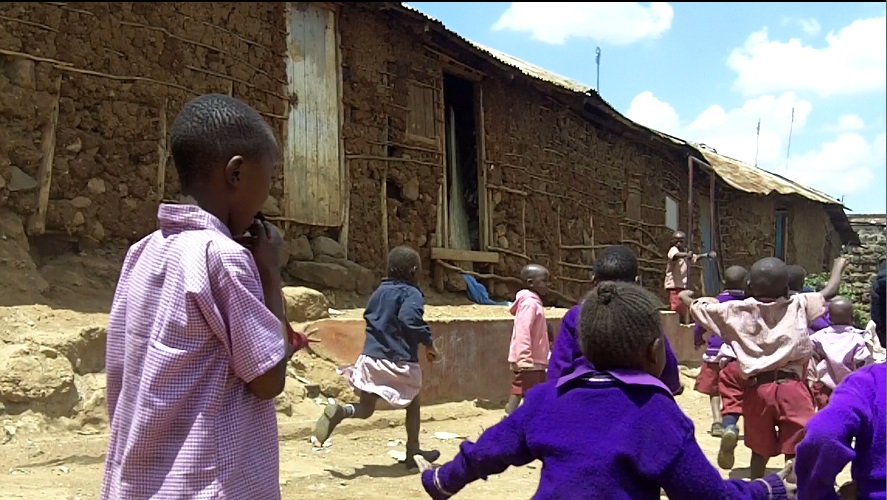
Soweto Academy in Soweto West
Education is the key to success in life, so they say. But the information on where the genuine key is offered has proved to be challenge to many parents in Kibera, and some just prefer getting the counterfeit keys than no keys at all, call it informal education.
“We give formal education in an informal setting. If you are going to give informal education to these children, and you expect them to compete with others, I think it’s going to be a very big challenge,†observes Fred Ogutu, School Director at Hope Academy.
The problems that hinder children from Kibera slums from acquiring quality education vary from village to village and school to school, though most of these problems are common in almost all the villages and schools that make up the Kibera slums.
Access to information, or lack of it, is far most the number one challenge that affect both the parents and schools. Most parents, due to various reasons that include poverty, are unable to know which school offers the right key to success and they mostly go for the cheapest school available or as advised by another parent who probably has a child in the same school, or both.
“We live here, we know the challenges that they have, one of them is paying school fees,†says one George Oketch, a teacher at Strays School in Kibera.
Another problem that affects the children, especially those in upper primary and high schools, is engaging in drugs and criminal activities that make them not be able to be in class when required.
A high percentage of private schools, lack enough books and classrooms to accommodate the large number of children who join the schools from the public schools. Whereas in public schools, the missing tool is quality education. Many parents interviewed believe that the teachers in public schools are no longer committed to their work since the introduction of free primary education. This has led to quality of education moving down the scale, hence success becoming more of a dream than a reality in these public schools. But another challenge is that, most of the private schools have not advanced beyond classes four and five, which forces parents to turn to public schools for upper primary education.
Which reminds me, school directors at both Wisdom Ashrays academy and Great Achievers school calls their schools complimentary schools. As a matter of fact, Wisdom Ashrays Director went further to say that there is no private school in Kibera and all schools that are not Public are complimentary schools, which left us a little bit confused. The clarification given to us concerning this was that, complimentary schools are not recognized by the government and the schools are still pushing for them to be recognized. “But I thought all schools that are not public are private schools, because they are owned privately,†I asked myself that. Well, I learnt about complimentary schools for the first time.
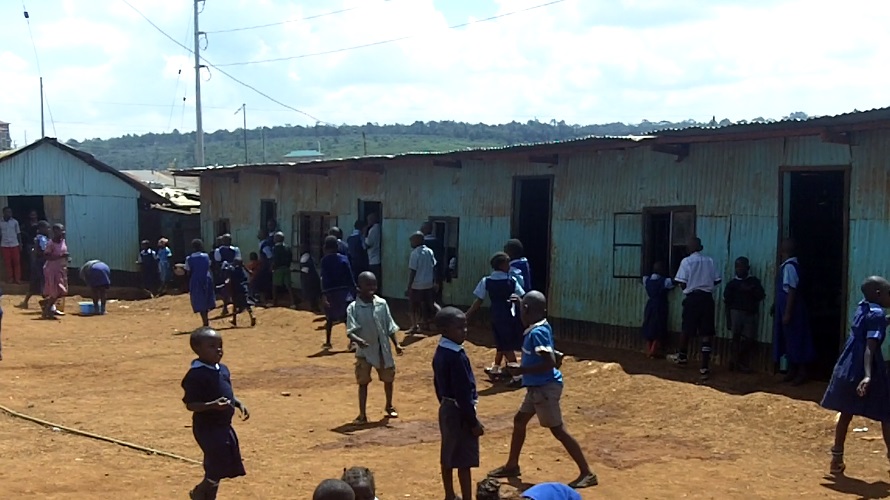
Hope Academy in Raila Village
Fred Ogutu, school director at Hope Academy believes that education is part of upgrading the children’s minds to bring positive change in the community.
“You don’t need to physically upgrade Kibera, you can upgrade the children in their minds and then the physical structures will go down,†he says. “In the slum upgrading houses, if you were to walk there now, you will discover that, that place is a slum, the drainage is not working because you don’t upgrade people by doing structures.â€
He also observed that the land in which most of these schools sit is government land, which makes it difficult for donors to help build permanent classrooms because most of the school owners are not sure how long they will be on the land before evictions take place.
“If you have a very temporary thinking about your land tenure system, you cannot invest,†says Fred Ogutu.
Poverty and joblessness has been identified as the biggest problem facing parents in having their children get quality education, as identified by both the parents themselves and teachers. This leads to the children being absent from class most of the time because they either lack school fees or are involved in other income generating activities that prevent them from attending school. This sometimes doubles up with other domestic issues where the parents quarrel hence creating a No-learning atmosphere.
Teachers also pointed out that the Kibera environment does not favour the schools, especially those deep in the slum, because when it rains, it gets so muddy and most children cannot make it to school. Many schools also overflow with a very large number of children in class, this applied to both the private and public schools.
Almost all schools that the survey was carried through offer lunch for the children, at a fee of course, except for the few that have feeding program support such as Mashimoni Squatters School whose feeding program is sponsored by the World Food Program.
Most parents, before taking their children to school, consider Distance, that is how close the schools is from where they live; cost in terms of schools fees; and if the schools offer some food because most of these parents go for work during the day, so they prefer that their children feed at school.
Children are the only raw materials from which you can manufacture responsible human beings, and the concerned parties need to do their best to ensure all children in the slums get good quality education that can help them in the future and shape them to be responsible successful adults.
But until the right and genuine key is given, that is education, success will continue to be a door that is only talked about but never opened.




